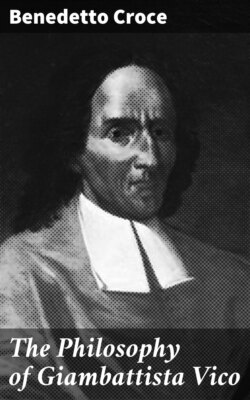The Philosophy of Giambattista Vico

Реклама. ООО «ЛитРес», ИНН: 7719571260.
Оглавление
Benedetto Croce. The Philosophy of Giambattista Vico
The Philosophy of Giambattista Vico
Table of Contents
WILHELM WINDELBAND. PREFACE
TRANSLATOR'S NOTE
CHAPTER I. VICO'S THEORY OF KNOWLEDGE: FIRST PHASE
CHAPTER II. VICO'S THEORY OF KNOWLEDGE: SECOND PHASE
CHAPTER III. INTERNAL STRUCTURE OF THE NEW SCIENCE
CHAPTER IV. THE IMAGINATIVE FORM OF KNOWLEDGE (POETRY AND LANGUAGE)
CHAPTER V. THE SEMI-IMAGINATIVE FORM OF KNOWLEDGE (MYTH AND RELIGION)
CHAPTER VI. THE MORAL CONSCIOUSNESS
CHAPTER VII. MORALITY AND RELIGION
CHAPTER VIII. MORALITY AND LAW
CHAPTER IX. THE HISTORICAL ASPECT OF LAW
CHAPTER X. PROVIDENCE
CHAPTER XI. THE LAW OF REFLUX
CHAPTER XII. METAPHYSICS
CHAPTER XIII. TRANSITION TO HISTORY: GENERAL CHARACTER OF VICO'S TREATMENT OF HISTORY
CHAPTER XIV. NEW PRINCIPLES FOR THE HISTORY OF OBSCURE AND LEGENDARY PERIODS
CHAPTER XV. HEROIC SOCIETY
CHAPTER XVI. HOMER AND PRIMITIVE POETRY
CHAPTER XVII. THE HISTORY OF ROME AND THE RISE OF DEMOCRACY
CHAPTER XVIII. THE RETURN OF BARBARISM: THE MIDDLE AGES
CHAPTER XIX. VICO AND THE TENDENCIES OF CONTEMPORARY CULTURE
CHAPTER XX. CONCLUSION: VICO AND THE LATER DEVELOPMENTS OF. PHILOSOPHICAL AND HISTORICAL THOUGHT
APPENDICES
APPENDIX I. ON THE LIFE AND CHARACTER OF G. B. VICO[1] I
II
III
IV
V
VI
VII
VIII
IX
APPENDIX II. THE LATER HISTORY OF VICO'S THOUGHT[1]
APPENDIX III. THE SOURCES OF VICO'S THEORY OF KNOWLEDGE[1]
APPENDIX IV. BIBLIOGRAPHICAL NOTES. I. WORKS OF VICO
II. REPRINTS, COLLECTIONS, AND TRANSLATIONS
III. BIOGRAPHY OF VICO
IV. LITERATURE ON VICO
Footnote
Отрывок из книги
Benedetto Croce
Published by Good Press, 2021
.....
Just as Vico depreciated metaphysics, theology, and physics, the sciences upon which Descartes had bestowed honour and attention, so he reinstated those branches of knowledge which Descartes had in turn despised; namely, history, observation of nature, empirical knowledge of man and society, eloquence and poetry. Or rather, he could vindicate them without reinstating them. Once he had shown that the lofty truths of a geometrically deduced philosophy were themselves brought down to mere probability, to statements having the validity of simple consciousness, the other forms of knowledge were ipso facto conclusively vindicated. All now found themselves upon an equality in the position, whether high or low, which we have described. The idea of a perfect human science, holding itself aloof from another science unworthy of the title, as founded not on reason but on authority, was shown to be illusory. The authority of observations and beliefs, whether one's own or others', public opinion, tradition, the consciousness of mankind, were restored to the position which they had always held: a position which they held even for Descartes himself, who, as often happens, despised the resources in which he was richest and of which he made the greatest use. A conspicuously learned man, he depreciated learning and scholarship, as one who has received nourishment from it might give himself the luxury of speaking with contempt of the common food which by now forms the very blood in his veins.
The Cartesian polemic against authority had proved in some respects beneficial. It put an end to the servile attitude, all too common, of continual appeals to authority. But this error was not more prevalent than that of private judgment, which presumed to reorganise knowledge from top to bottom on the strength of the individual consciousness: a tendency which ultimately, as in the case of Malebranche, leads to prophesying the immolation of all the ancient philosophers and poets, and a return to the nakedness of Adam. It is a fallacy, or at least an excess, which should be avoided by adopting a sound middle course. This course consists in following private judgment with due regard to authority; in a true catholic union of faith with a criticism limited by and helpful to faith; bearing in mind the necessary character of mere probability which is proper to human knowledge or science, and avoiding the tendency of the Reformation which elevates each man's inner consciousness into a divine guide in matters of belief.
.....